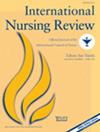Global reasons for missed nursing care: a systematic review and meta-analysis
Abstract
Background
While numerous studies have quantified the prevalence of reasons for missed care, a comprehensive synthesis of evidence across various health systems remains lacking.
Aim
To estimate the pooled prevalence of the reasons reported by nurses for missed care, using data from the MISSCARE surveys.
Introduction
Missed nursing care, which refers to any aspect of essential patient care that is omitted or delayed, presents substantial risks to patient safety and the quality of care.
Methodology
Four databases (PubMed, Web of Science, Embase, and Scopus) were searched, without language restrictions. Study quality was assessed using Joanna Briggs Institute's critical appraisal tool. A random-effects meta-analysis was used to calculate prevalence estimates and evaluate heterogeneity via prediction intervals. Subgroup analyses were conducted to assess potential sources of heterogeneities. Time trends were estimated using linear regression modeling.
Results
Twenty-eight studies (2011–2024) totaling 20768 nurses from 121 hospitals from 14 countries were included. The raw prevalence of missed care ranged from 6.8% to 98.1%, with a median of 56.4% (IQR: 41.0–75.4). The most frequently reported reasons were “unexpected rise in patient volume and/or acuity on the unit” (78.1%; 95% confidence intervals (CI) 71.5–54.1), “inadequate number of staff” (76.5%; 95% CI, 68.7–83.5), and “urgent patient situation” (73.5%; 95% CI, 66.6–79.9). Most of the investigated reasons for missed nursing care showed no significant changes over time.
Conclusion
This meta-analysis provides valuable insights that can inform interventions and policies aimed at mitigating missed nursing care, ultimately improving patient safety and healthcare outcomes.
Implications for nursing and health policy
This study underscores the global prevalence reasons for missed nursing care. The findings call for comprehensive strategies to address this crucial challenge, regardless of geographic region and economic status of countries. However, special attention should be given to non-university hospitals and hospitals with specific demographic characteristics of nurses.

 求助内容:
求助内容: 应助结果提醒方式:
应助结果提醒方式:


